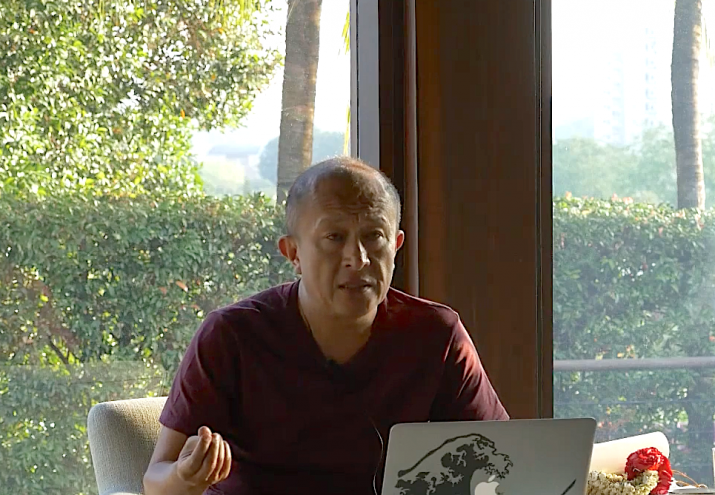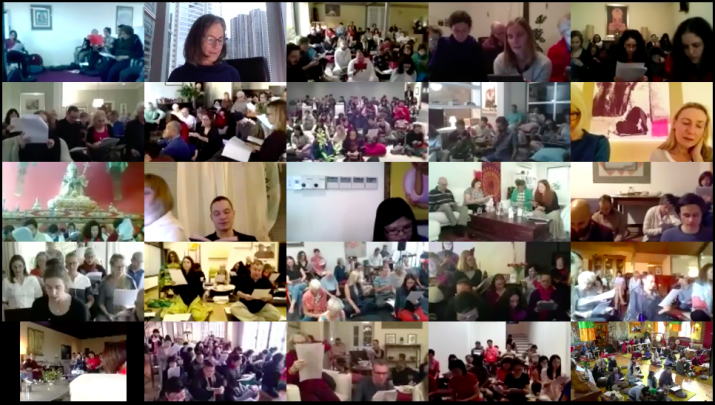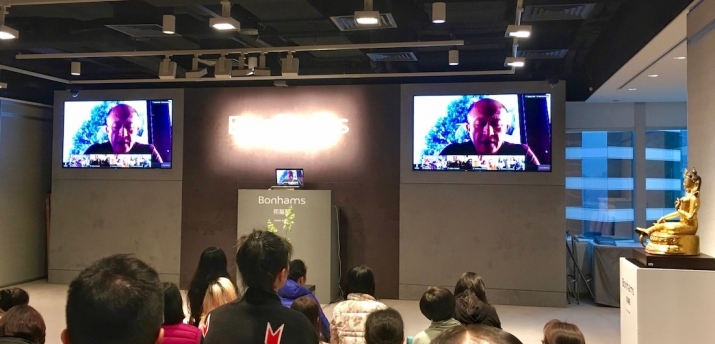NEWS
Dzongsar Khyentse Rinpoche Leads Global Sutra Resounding
 Led by Dzongsar Khyentse Rinpoche from Singapore at 0630 local time (2230 GMT), the historic live-streamed event spanned multiple time zones, with participants joining from across the globe. From youtube.com
Led by Dzongsar Khyentse Rinpoche from Singapore at 0630 local time (2230 GMT), the historic live-streamed event spanned multiple time zones, with participants joining from across the globe. From youtube.comUPDATE: Adds new details and quotes.
HONG KONG—Coinciding with the celebration of Losar, the traditional Tibetan New Year, which this year fell on 27 February, Dzongsar Khyentse Rinpoche on Monday presided over a global sutra resounding in which Buddhists in 37 cities, in 20 countries around the world, joined together online to simultaneously recite the words of the Buddha.
Traditionally a monastic ritual, a resounding involved the concurrent recitation of the Tibetan Kangyur (the translated words of the Buddha), with each monastic responsible for reciting a different section until the Kangyur was read in its entirety. During Monday’s worldwide resounding, participants read aloud from Buddhist sutras recently translated by Rinpoche’s non-profit initiative 84000—among them, The Sutra on Dependent Arising, The Sutra on Wisdom at the Hour of Death, The Question of Maitreya on the Eight Qualities, and The Illusory Absorption.
“On this very special occasion, as we end the Year of the Monkey . . . I’m happy that this new year has begun with a very special activity of reading the sutras,” Dzongsar Khyentse Rinpoche said in the prelude to the resounding. “It is believed by Tibetans that whatever you do on the day of the New Year that it will have an impact on the rest of the year, and hopefully this is what will happen.”
 Some 900 participants and more than 11,000 observers tuned in for the live-streamed event, in 37 cities in 20 countries around the world. Image courtesy of 84000
Some 900 participants and more than 11,000 observers tuned in for the live-streamed event, in 37 cities in 20 countries around the world. Image courtesy of 84000“Those who are fortunate enough have actually met Shakyamuni Buddha in person . . . more than 2,500 years ago,” Rinpoche continued. “The rest of us, we have to be happy with the representation of the image of the Buddha. For the common people like you and me, the only thing that we can get acquainted with is the speech of the Buddha, and this why resounding the sutras is really like getting acquainted with the Buddha . . . directly.”
Led by Rinpoche from Singapore at 0630 local time (2230 GMT), the event spanned multiple time zones, with some 900 participants and more than 11,000 observers joining the live-streamed feed from as far afield as Canada, the United States, Mexico, Brazil, Britain, Portugal, Greece, Germany, Poland, India, Bhutan, Singapore, Malaysia, Hong Kong, Taiwan, China, Japan, and Australia. Rinpoche concluded Monday’s resounding by giving oral transmissions of Kagyu Ngondro, Longchen Nyingthik Ngondro, and Chetsun Nyingthik Ngondro.
Dzongsar Khyentse Rinpoche first suggested a global sutra resounding while in Bodh Gaya in October 2013. He envisaged the ritual taking place in multiple locations across the world between groups of people connected online, and a successful trial resounding was held in December 2015. While on one level a means of promoting the reading and learning of the Buddha’s words, a sutra resounding can also be considered a means for transmitting the teachings into the universe as a blessing for the world and a means of generating merit. Monday’s resounding was coordinated and hosted by Rinpoche’s global non-profit initiatives 84000 and Siddhartha’s Intent.
84000 began translating the words and teachings of the Buddha into modern languages in 2010, with the aim of preserving the teachings and making them available to all. According to 84000, only 5 per cent of the Buddha’s teachings have been translated into modern languages, and due to the rapid decline in knowledge of classical languages and in the number of qualified scholars, the world is in danger of losing this unique cultural and spiritual legacy. 84000 is a long-term undertaking to translate 70,000 pages of the Kangyur (the translated words of the Buddha) in 25 years and 161,800 pages of the Tengyur (the translated commentaries on the teachings) in 100 years. The organization supports 38 teams of 201 translators from around the world, including Tibetan scholars and Western academics. “By translating and making available the Tibetan Buddhist texts to modern people, a vast swath of Buddhist civilization and culture may be saved from annihilation,” Dzongsar Khyentse Rinpoche has said. (84000)
“Interestingly, although the stated purpose of the 84000 resounding was to recite the newly translated texts, which are in English, the majority of the countries participating are countries where English is spoken, maybe, as a second language,” Wilkinson noted. “Many people asked if they could read sutras in languages more familiar to them—such as Chinese, Spanish, and Arabic—which of course is entirely permissible! It’s so beautiful to me that people wanted to participate, whether or not they are able read to the texts in English!”
 Followers gathered in downtown Hong Kong to join the worldwide sutra resounding. Photo by Buddhistdoor
Followers gathered in downtown Hong Kong to join the worldwide sutra resounding. Photo by BuddhistdoorBorn in Bhutan and now based in Himachal Pradesh, India, Dzongsar Khyentse Rinpoche gives teachings all over the world. Rinpoche is the son of Thinley Norbu Rinpoche and was a close student of the Nyimngma master Dilgo Khyentse Rinpoche (1910–91). He is recognized as the third incarnation of Jamyang Khyentse Wangpo (1820–92), founder of the Khyentse lineage, and the immediate incarnation of Jamyang Khyentse Chökyi Lodrö (1893–1959). In addition to 84000, his projects include Siddhartha’s Intent, which organizes, distributes, and archives his teachings; the Khyentse Foundation, which provides the financial support to fulfill his aspirations; Lotus Outreach, which directs a wide range of projects to help refugees; and most recently The Lhomon Society, which promotes sustainable development in Bhutan through education.
See more
84000: Translating the Words of the Buddha
84000: Reading Room
Siddhartha's Intent
The Activities of Dzongsar Jamyang Khyentse Rinpoche
Related news from Buddhistdoor Global
His Holiness the Karmapa Awards Khenpo Degrees at Dzongsar Institute
84000 Marks Launch of New Virtual Reading Room with Release of 10 Translated Tibetan Texts
Dzongsar Khyentse Rinpoche Urges “Radical” Reform of Tulku Training in the Vajrayana Tradition
Dzongsar Khyentse Rinpoche’s Fourth Film Debuts in Switzerland
Dzongsar Khyentse Rinpoche Concludes Rinchen Terdzö Empowerments in Bhutan
Khyentse Foundation Announces Award for Excellence in Buddhist Studies Recipients
Tibetan Buddhist Resource Center to Preserve Texts From All Buddhist Traditions
Related features from Buddhistdoor Global
Seeing the Sacred: an Interview with Pawo Choyning Dorji, Producer of Hema Hema: Sing Me A Song While I Wait
The Khyentse Foundation Leadership Project: Teaching Leadership and Management in Tibetan Buddhist Monasteries
Modern Education and the Future of Buddhism: An Interview with Dzongsar Khyentse Rinpoche

- Africa / Middle East Australia / New Zealand Central Asia China / Hong Kong / Taiwan Europe / Russia Korea / Japan North America South / Central America South Asia Southeast Asia Tibet / Himalayas / Mongolia Exhibitions / Conferences Festivals / Teachings People and Personalities Travel / Pilgrimage













